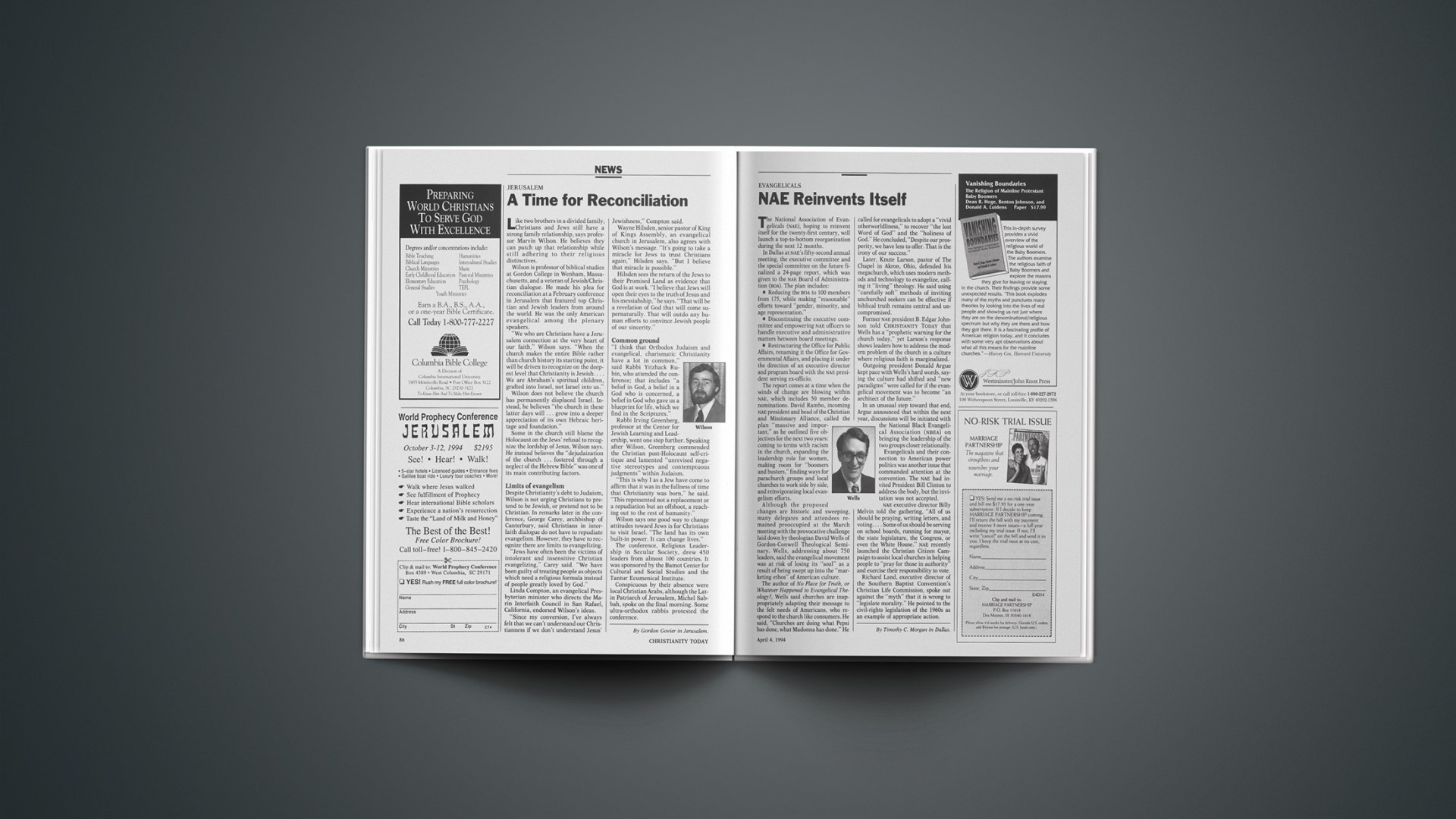The National Association of Evangelicals (NAE), hoping to reinvent itself for the twenty-first century, will launch a top-to-bottom reorganization during the next 12 months.
In Dallas at NAE’s fifty-second annual meeting, the executive committee and the special committee on the future finalized a 24-page report, which was given to the NAE Board of Administration (BOA). The plan includes:
• Reducing the BOA to 100 members from 175, while making “reasonable” efforts toward “gender, minority, and age representation.”
• Discontinuing the executive committee and empowering NAE officers to handle executive and administrative matters between board meetings.
• Restructuring the Office for Public Affairs, renaming it the Office for Governmental Affairs, and placing it under the direction of an executive director and program board with the NAE president serving ex-officio.
The report comes at a time when the winds of change are blowing within NAE, which includes 50 member denominations. David Rambo, incoming NAE president and head of the Christian and Missionary Alliance, called the plan “massive and important,” as he outlined five objectives for the next two years: coming to terms with racism in the church, expanding the leadership role for women, making room for “boomers and busters,” finding ways for parachurch groups and local churches to work side by side, and reinvigorating local evangelism efforts.
Although the proposed changes are historic and sweeping, many delegates and attendees remained preoccupied at the March meeting with the provocative challenge laid down by theologian David Wells of Gordon-Conwell Theological Seminary. Wells, addressing about 750 leaders, said the evangelical movement was at risk of losing its “soul” as a result of being swept up into the “marketing ethos” of American culture.
The author of No Place for Truth, or Whatever Happened to Evangelical Theology?, Wells said churches are inappropriately adapting their message to the felt needs of Americans, who respond to the church like consumers. He said, “Churches are doing what Pepsi has done, what Madonna has done.” He called for evangelicals to adopt a “vivid otherworldliness,” to recover “the lost Word of God” and the “holiness of God.” He concluded, “Despite our prosperity, we have less to offer. That is the irony of our success.”
Later, Knute Larson, pastor of The Chapel in Akron, Ohio, defended his megachurch, which uses modern methods and technology to evangelize, calling it “living” theology. He said using “carefully soft” methods of inviting unchurched seekers can be effective if biblical truth remains central and uncompromised.
Former NAE president B. Edgar Johnson told CHRISTIANITY TODAY that Wells has a “prophetic warning for the church today,” yet Larson’s response shows leaders how to address the modern problem of the church in a culture where religious faith is marginalized.
Outgoing president Donald Argue kept pace with Wells’s hard words, saying the culture had shifted and “new paradigms” were called for if the evangelical movement was to become “an architect of the future.”
In an unusual step toward that end, Argue announced that within the next year, discussions will be initiated with the National Black Evangelical Association (NBEA) on bringing the leadership of the two groups closer relationally.
Evangelicals and their connection to American power politics was another issue that commanded attention at the convention. The NAE had invited President Bill Clinton to address the body, but the invitation was not accepted.
NAE executive director Billy Melvin told the gathering, “All of us should be praying, writing letters, and voting.… Some of us should be serving on school boards, running for mayor, the state legislature, the Congress, or even the White House.” NAE recently launched the Christian Citizen Campaign to assist local churches in helping people to “pray for those in authority” and exercise their responsibility to vote.
Richard Land, executive director of the Southern Baptist Convention’s Christian Life Commission, spoke out against the “myth” that it is wrong to “legislate morality.” He pointed to the civil-rights legislation of the 1960s as an example of appropriate action.
By Timothy C. Morgan in Dallas.










